Upstairs at the MU
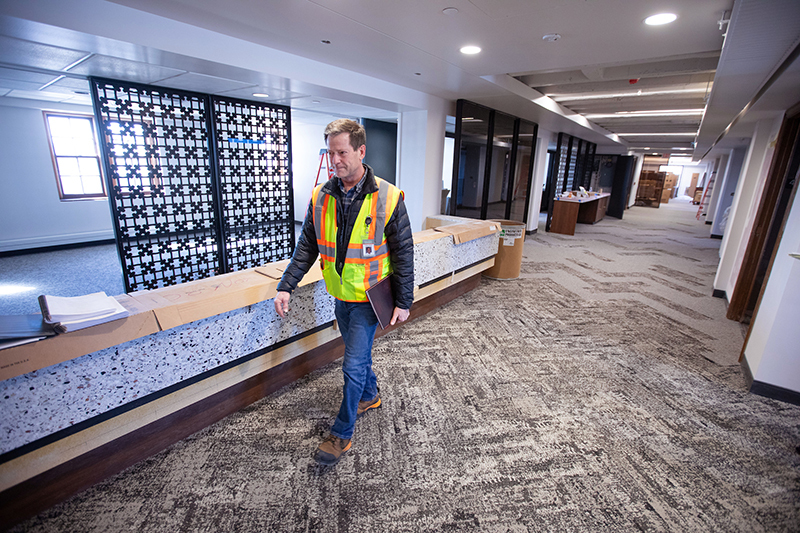
Construction manager Bart Dobson, facilities planning and management, passes in front of the reception area on the Memorial Union fourth floor, the floor closest to completion. Photos by Christopher Gannon.
A 15-month, $10 million renovation of the top three floors at the Memorial Union is in the homestretch this spring. The three levels are in varying stages of completion, but finishes such as lighting and flooring are going in now, to be followed by furniture and information technology installations.
MU associate director for operations Brad Hill said tenants -- student affairs service offices -- will start moving in by early May. Scheduled for move-in are the staffs of:
- Floor 6: ISCORE/NCORE, Lectures Program, Student Legal Services
- Floor 5: Veterans Center, tenant to be determined
- Floor 4: International Students and Scholars, The Center (LGBTQIA+ Student Success)
"We are excited the project is nearing completion and that we'll be able to open these dynamic new spaces to students soon," Hill said.
One of the project goals was to give visibility to units that support students and make it easier for students to find them with a prominent location in the student union. It also eliminates several million dollars of deferred maintenance, replacing the heating, cooling, plumbing, electrical, communications and security systems for floors four, five and six. Windows and the building's two elevators are about the only features that weren't replaced.
Numerous additions to the Memorial Union over its 90-plus years created expansive lower levels, but its top floors are noticeably narrower -- about 15 yards wide and 45 yards long on floors five and six, 20 yards longer on the fourth floor. In the place of dark corridors and small rooms that defined their years as a dormitory and hotel, the renovated space features open floor plans that share the natural daylight, centralize shared work spaces and student collaboration areas, and distribute staff offices around the perimeter. A shared reception area and restrooms also are centrally located on each floor.
Decorative metal panels in the renovated spaces play off the filigree grillwork found on lower floors of the Memorial Union, including over significant interior doorways and stairwell entrances and as radiator cabinet faces. In addition, staff in the agricultural and biosystems engineering department's waterjet cutting lab in the Student Innovation Center are collaborating with the MU facilities team to prepare custom corner grills that will cover exposed steam pipes in 42 locations on the three floors.
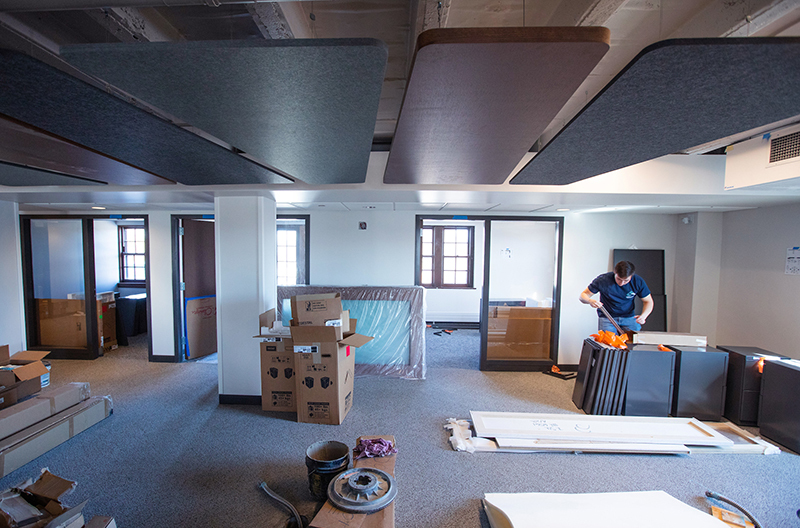
Work commences on assembling furniture for fourth-floor offices of the Memorial Union. Also visible is the multi-paneled floating ceiling, which will include light bars between the panels when it is complete.
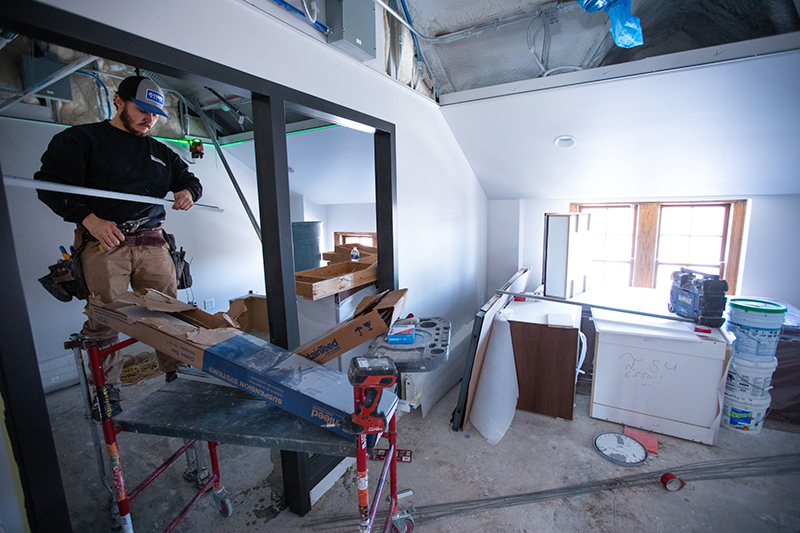
A subcontractor assembles the frame for a drop ceiling in a sixth floor office of the Memorial Union.
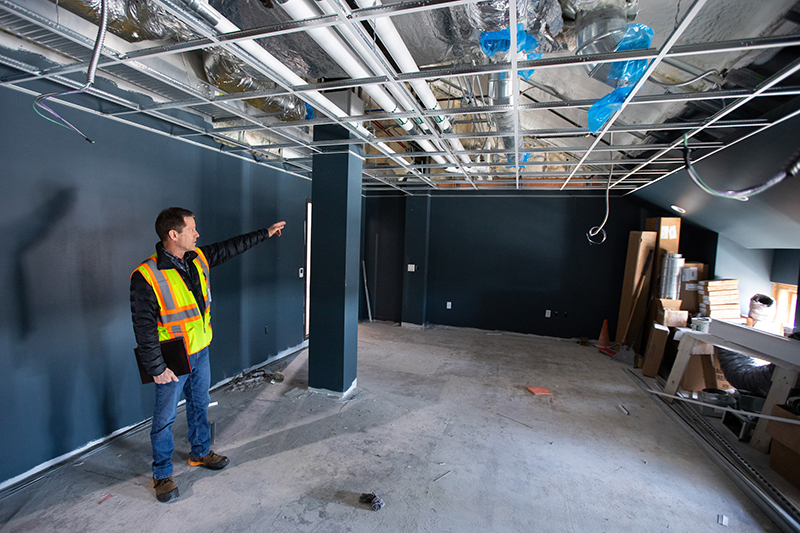
Construction manager Bart Dobson, facilities planning and management, explains finishing details for a sixth floor conference room in the Memorial Union.
This one's for (all of) you
Whether you've worked here seven months or 57 years, there likely are campus experiences you haven't enjoyed yet, say, a glass of wine at Hilton Coliseum's Johnny's, a hike through underground steam tunnels or the polished campus walking tour provided every weekday by the admissions office's student guides.
Faculty and Staff Appreciation Week, March 28-April 1, is designed to help fix that -- and say "thank you." Supported by the offices of the president, senior vice presidents and university human resources, a lineup of special events and experiences is intended to recognize faculty and staff members' hard work and dedication to Iowa State during a couple of challenging years. So, plan to explore campus with your peers and maybe make a few new friends.
"For the past two years, our faculty and staff have shown great commitment and care, made personal sacrifices and gone above and beyond to keep Iowa State moving forward through the pandemic," said President Wendy Wintersteen. "This is an opportunity to show appreciation, reconnect with colleagues and strengthen our sense of community."
More to come
On the heels of spring break, employees will receive an invitation email Monday, March 21, that shares the details of Faculty and Staff Appreciation Week. Due to space limitations that will cap participation in some events, there will be an online registration site, and employees can select events that interest them.
For example, a selfie with a to-be-named campus sculpture earns you a free ice cream from the ISU Creamery. Many know about ISU's 18-hole disc golf course north of the Frederiksen Court student apartments, but did you know the Vet Med campus also boasts a nine-hole course? You're invited out to try it. Curious to learn more about the not-just-paper products you can get from printing services, the new beer brewing lab in Food Sciences or how the student-operated food pantry works? There will be tours for those, too. Several events will include virtual or carry-out options.
Senior leaders shared information about Faculty and Staff Appreciation Week with supervisors this week and asked them to permit their employees reasonable participation while still meeting office needs. Nonexempt staff should remain on the clock if they participate in events during their normal work hours.
Schmittmann discusses Reimagining LAS initiative with senators
College of Liberal Arts and Sciences (LAS) dean Beate Schmittmann spoke with the Faculty Senate at its March 8 meeting about the recently announced Reimagining LAS initiative.
The $11.4 million annual budget deficit the college began this fiscal year with, in a $105 million budget, is expected to grow to $15 million by FY2025. To deal with the deficit, the college will use several strategies, including reductions to the college's central programs and services and reductions to 19 department budgets that range from zero to 25%. The process will last for several years, through June 2026.
"We have already reduced our central non-departmental college operations, reduced faculty hiring and, a couple of years ago, had an across-the-board cut of 10% to all of our programs," Schmittmann said.
In fall 2021, ISU enrolled about 16% fewer students than in 2016, and nearly 90% of LAS revenue comes from tuition, Schmittmann said.
The number of college credits students come to campus with also rose significantly over the past 12 years. In 2008, freshmen, on average, started college with 7.6 early credits. By fall 2019, that grew to 17.2 credits earned.
"The increase is predominantly credits [that would come] from LAS, which is a lot of lost student credit hours and attached revenue," she said.
Schmittmann said any significant changes to programs or departments will follow university and state Board of Regents policies. Action plans and financial tools provided by the dean's office will help department chairs model budget implications and determine the best path forward, but "very difficult decisions sometimes have to be made."
Senators inquired about the amount of faculty input sought when determining departmental cuts. Others questioned whether other colleges are facing similar economic issues.
"Each college is unique, but LAS is the only college that has an issue of this scale that requires this kind of effort right now," said senior vice president and provost Jonathan Wickert.
Election
Michael Bootsma (accounting), Heather Greenlee (biomedical sciences) and William Jenks (chemistry) were elected as Faculty Senate representatives to the athletics council. Members are eligible for two three-year terms on the council.
Committee chair
Apparel, events and hospitality management associate professor Kelly Reddy-Best was named the chair of the U.S. diversity course requirement committee that began its work this semester. The permanent committee is responsible for approving courses proposed to satisfy the U.S. diversity requirement. It is overseen by the academic affairs council.
Name change
Senators approved a name change for the bachelor's in agriculture and society program, to agricultural and rural policy studies in the College of Agriculture and Life Sciences. Discussions about curriculum changes for the program continue among department chairs and associate deans.
Five questions with an extension specialist
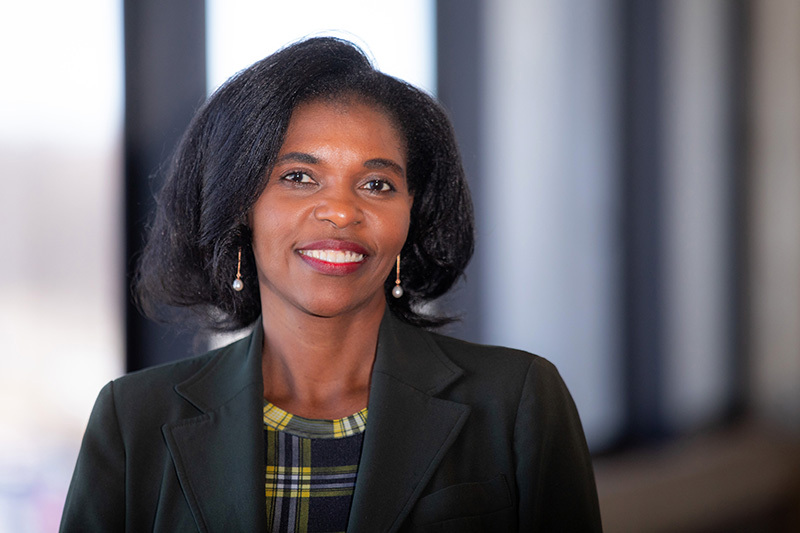
Jeannette Mukayisire is fluent in four languages and uses them often through extension programs. Photo by Christopher Gannon.
Jeannette Mukayisire (Moo-k"eye"-see-reh) helps people improve their financial situation. She works with a variety of ISU Extension and Outreach programs, including Volunteer Income Tax Assistance (VITA), Finances of Caregiving and Money Smart. She also is involved with Salir Adelante to help prepare Latinx youth and families for college or employment.
Name: Jeannette Mukayisire
Position: Human sciences specialist, family well-being
Years with ISU Extension and Outreach: 7
Education: Bachelor's in communication and a master's in public policy from the University of Northern Iowa
Mukayisire's success is aided by her own immigrant experience coming from Rwanda, which mirrors, at least in part, many of the people she serves. Mukayisire is fluent in four languages and uses them often through extension programs. She recently spoke to Inside about her role in extension and how her background helped shape her desire to help others.
How does your work help immigrants and improve their communities?
I cover northeast Iowa and work in regions 5 and 10. I work in Black Hawk County in partnership with the Hawkeye Community College adult learning center where immigrants get their GED or learn English. The county has lots of immigrants who are unaware of the tax system in this country and are being taken advantage of. We brought the VITA program to teach them for the past four years. Now they have a reliable way to get their taxes done, and they can help people in their community if they have a question. I also work with Latin families as well as Somali families in my regions and introduce them to extension programming.
How does your background help in the VITA program?
In the fall, the Internal Revenue Service (IRS) publicizes tax materials and provides training for me before I train the volunteers at the community college and a site in New Hampton. The volunteers have to pass an IRS test and then they are able to do people's taxes.
Immigrant volunteers do not have some of the IRS tax terminology in their native languages, such as a tax refund, so I can explain it in another language that makes it easier for them to understand those new terms.
How did you learn to speak four languages?
I am from Rwanda, and we have a mother tongue that we speak called Kinyarwanda, but when you go to school you start to study in another language. All the material was in the language of the country that colonized you, so for us everything was in French, and that is how I learned French. I also speak Swahili because it is spoken in several neighboring countries.
I came to the United States in 2000. During the genocide in Rwanda, a women from a church in Cedar Falls came to my country. She asked me what my plans were and said I should come to the University of Northern Iowa. I came and studied English before I started taking courses at the university. I also have learned some Spanish because I am running a Spanish program for Latino families.
English was probably the hardest to learn because it doesn't follow the rules like other languages.
What is the key to learning a new language?
There needs to be a motivating reason to learn a language. When people don't have that, often they won't stick with it, or they really struggle. Find that motivation, whether it is because you want to travel there, or you're interested in the people or the food. It is that passion that will make you successful.
What motivates you in your work?
When I started, I wanted to help women because studies show they will use money to better their family. I want to help immigrant families be able to make wise decisions with their finances. It is the same reason I wanted to do something when I saw immigrants being taken advantage of when it came to their taxes.
Some immigrants are coming from countries that have experienced war, and I know how that goes because I have been in their shoes. I never expected it, but it has been a good meshing with my life and educational experience.
Soupir appointed to Graduate College leadership team
Michelle Soupir, professor of agricultural and biosystems engineering (ABE), has been appointed to a two-year appointment as an interim associate dean in the Graduate College. The half-time appointment will begin April 4.
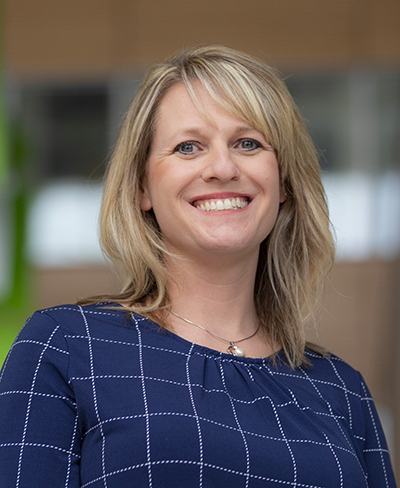
Soupir
Soupir, who joined the Iowa State faculty in 2008, currently serves as associate chair for research and extension in ABE and equity advisor for the College of Engineering. She also has a courtesy appointment in the department of civil, construction and environmental engineering. In the new role, she will focus her efforts on a broad-based initiative to enhance and modernize Graduate College operations to better support students, postdoctoral scholars and graduate faculty.
"I'm excited to have Michelle join the Graduate College to oversee this important initiative," said Graduate College Dean William Graves. "Her work will lead to new efficiencies and clarity in policies and procedures, while improving the overall graduate experience at Iowa State."
Soupir earned a bachelor's degree from Kansas State University, Manhattan, and master's and doctoral degrees from Virginia Tech University, Blacksburg, all in agricultural and biological systems engineering. She has received numerous awards for her work in equity, diversity and inclusion, as well as for her research focused on the impacts of agricultural practices on water quality, and designing conservation practices to reduce pollution in downstream waters.
"I'm excited to work with students and colleagues from across the university to create environments that allow students to get the most from their graduate education, whether it's a steppingstone to an academic or industry career, a promotion or a thirst for greater knowledge," Soupir said.
The College of Engineering will fill Soupir's equity advisor role in the coming weeks.
P&S Council looks to help peers share expertise
When Sara Parris arrived at Iowa State in 2015, there was a lot to like about her new job. Managing the finances of the Thielen Student Health Center was interesting and rewarding.
But it also was isolating, she said. There are many budget officers on campus, but nobody else in the human health care field and only a handful in auxiliary units such as Thielen. Finding a colleague to turn to with questions wasn't easy.
"There were many times when I thought to myself, 'Someone on campus has to be doing this. And they have to be doing it really well. But I have no idea who they are or how to find them,'" said Parris, past president of the Professional and Scientific Council. "So I had to create everything from scratch, with a lot of trial and error along the way."
While her sense of isolation faded as she became more seasoned and got involved in council, Parris still feels like she's trying to reinvent the wheel at times, pondering problems someone else on campus has already solved. She's hoping a new council initiative she's leading will make that experience less common.
A peer expert community soon will be available to employees in Canvas, giving ISU staff discussion boards for sharing advice and posting questions about work topics. The forum for lending expertise is meant to be an additional resource, Parris told the council at its March 3 meeting, not a substitute for submitting help requests or reviewing knowledge base articles in the ISU Service Portal.
Parris will chair an ad hoc committee focused on building and stabilizing the peer expert community, continuing in that role into the fall even after her term on council ends in June. A prototype should be ready for council to test by April. She plans to set the timeline for a campuswide launch in consultation with the committee.
"I've had this idea for several years now, and I'm really excited it's finally coming to fruition," she said.
Salary motion approved
The council approved a motion to submit its annual compensation and benefits report and recommendation to senior leaders.
Though it doesn't propose a specific raise for fiscal year 2023, which begins July 1, the council's recommendation notes that P&S staff are taking on more duties and paying more for health insurance. To retain and recruit talented employees, salaries must get more competitive, the council's recommendation states. Average raises over the last four years have lagged behind inflation, a problem that got worse in 2021 when inflation spiked to 7%, the report said.
Additions to the report since the first reading of the motion in February address the 6% increase to the P&S salary matrix the state Board of Regents approved Feb. 23. The boosted pay ranges were effective March 1 and are based on recent and projected salary increases in higher education. Raising pay ranges without significant increases for existing staff is unacceptable, said Patrick Wall, chair of the council's compensation and benefits committee.
Officers elected
Council members elected Wall, a Knoxville-based beef field specialist for ISU Extension and Outreach, to serve as the president-elect for 2022-23. Current president-elect Jamie Sass, director of the Ivy College of Business Writing and Speaking Center, will serve as council president in 2022-23.
Other council members elected to serve in officer positions in 2022-23 are:
- Sarah Larkin, vice president for university community relations
- Marlene Jacks, vice president for equity and inclusion
- Susan DeBlieck, secretary/treasurer
Council representatives will be elected later this month in an online vote open to all P&S staff. P&S employees will receive an email with an election link for the representative in their division March 21. Voting closes March 27.
Term staff studied
The council's policies and procedures committee is studying a possible recommendation to limit how long P&S staff can be on a term appointment before being considered continuous employees, said committee chair Paul Easker. A little more than 25% of the nearly 3,300 P&S employees are on term appointments. More than half of those appointments end in 2022, and 78% don't extend past 2023, based on data he shared with the council.
The committee's next step is to determine how many of the term appointments are grant funded, Easker said.
Bowling together
P&S staff are encouraged to enjoy free pool and bowling at CyBowl and Billiards in the Memorial Union from 3-5 p.m. March 10 during the council's annual meet and greet event. Refreshments will be provided and no preregistration is needed.
